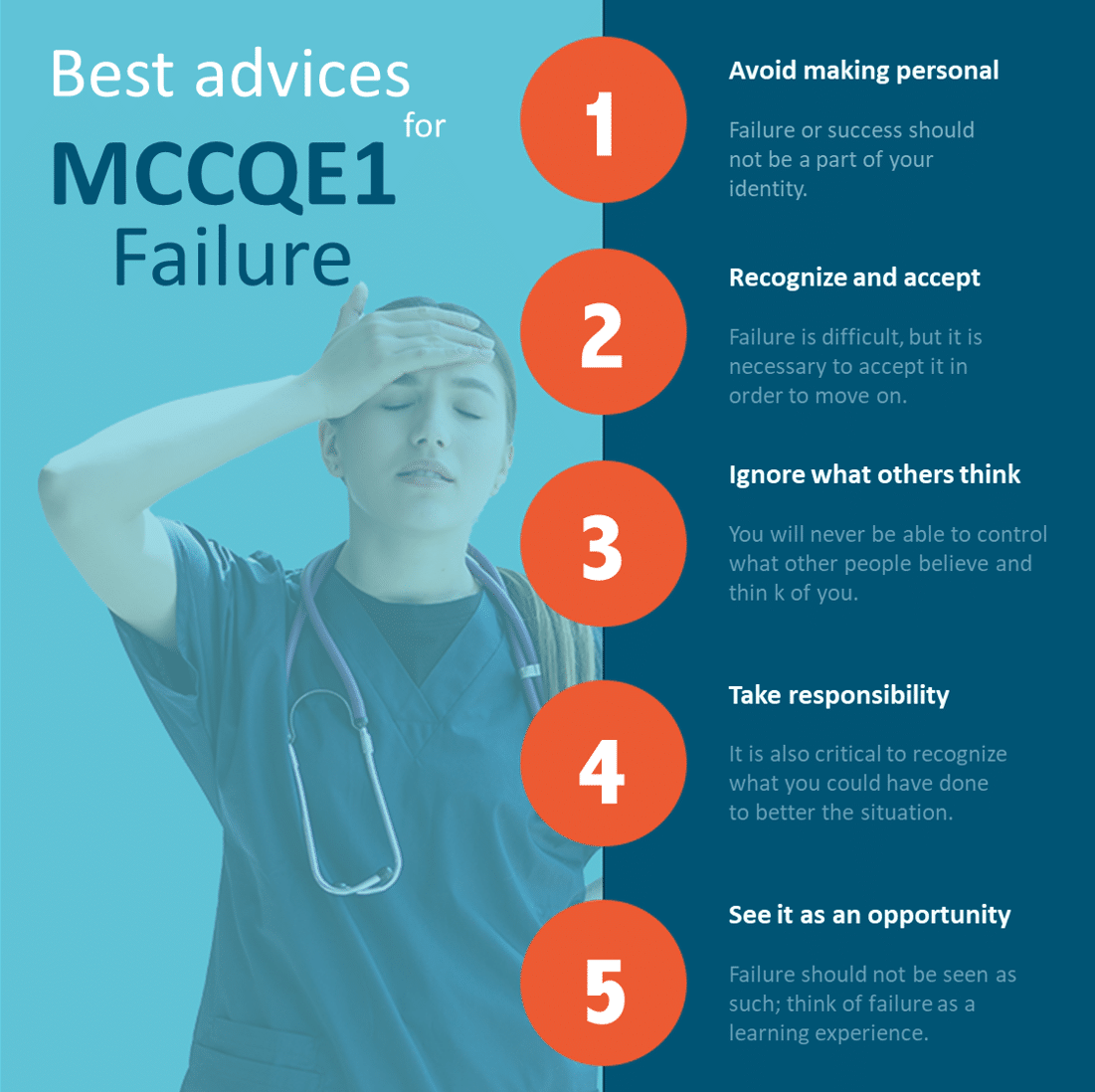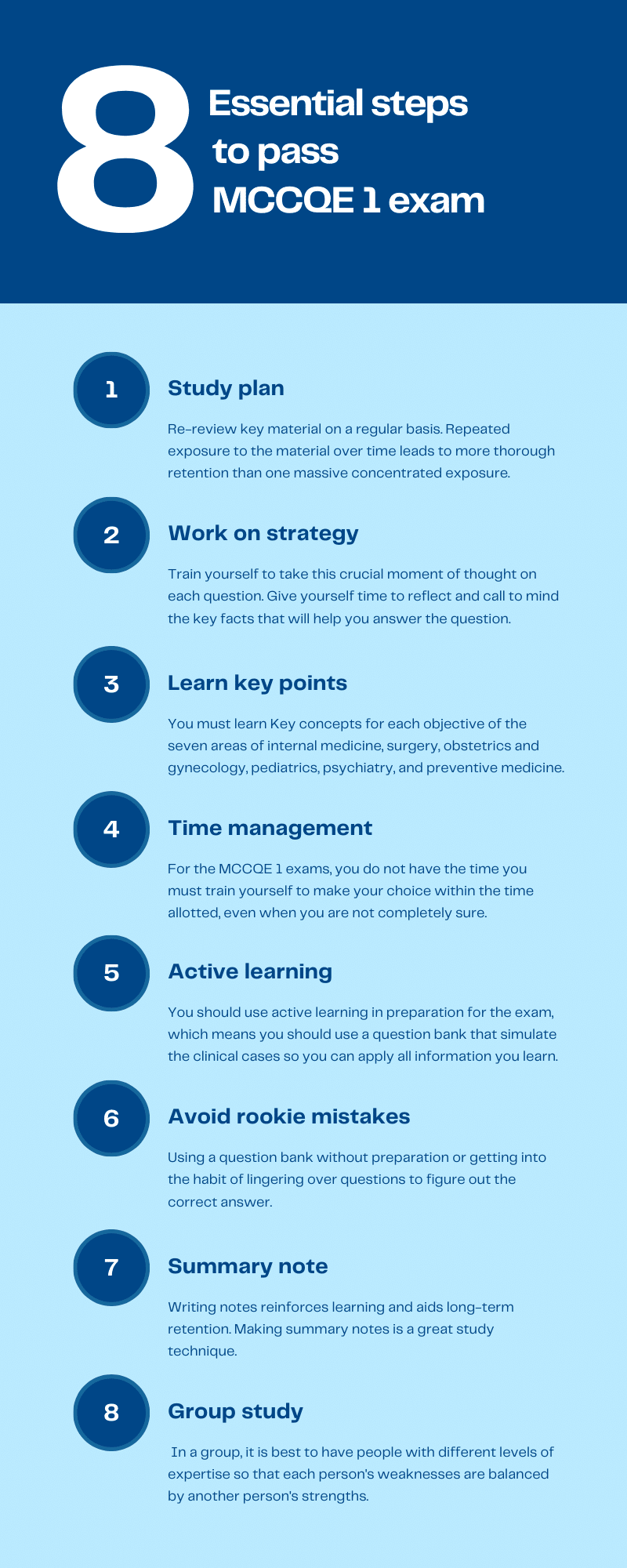What To Do If You Fail The MCCQE1 Exam?

The Medical Council of Canada Qualifying Examination (MCCQE) part 1 exam is not for everyone. You have to study for it very hard in order to pass it. Whoever has taken the MCCQE1 exam will tell you that it is a challenging exam. To pass, one must have a good grasp of the material being tested. The exam is a computer-based one day, multiple-choice exam of the most up-to-date information in the medical field. The exam consists of 210 multiple choice questions and 38 clinical decision-making (CDM) cases, and typically, the exam takes eight hours.
Thousand of people take the MCCQE1 exam to get their license to practice in Canada each year. Of them, many of them fail. If you’re one of them, you’re not alone. It happens to more than half of the people who take the exam. However, your MCCQE1 exam failure can be your opportunity to start over. Use this moment as a learning opportunity, accept that you can’t change the past, and focus on what you can control: the future.
Here are some suggestions to help you get ready for your next attempt. First of all, you will need to get rid of the negative feelings that may be affecting your motivation. Don’t feel like you need to get the MCCQE1 exam right the first time. It’s not an easy exam. This blog will explore, explain, and discuss study methods and test-taking strategies, as well as preparation suggestions to help you pass the MCCQE1 exam. Check out these test-taking strategies and preparation tips:
Why you shouldn’t feel bad for failing the MCCQE1 exam
Sure, failure is painful. Whenever we think about failure, we tend to see things from a negative perspective. Failure is said to be painful because it generates mental turbulence, unhappiness, and terrible emotions of guilt, regret, and remorse. Those who have experienced actual failure and recovered from it understand that failure in life is important for success.
Failure, according to Merriam-Webster, is defined as a lack of success. The logical assumption is that you are only successful when you achieve your end goal. In other words, the process in between is irrelevant. It’s either success or failure, and it’s written in black and white, which is one of the key reasons people fear and dislike failure because of this disempowering definition.
On the other hand, words are extremely powerful and have the ability to affect behaviour; therefore, it’s important to use words that empower. Here is some example that will probably help you see failure in a new light.
If you tell yourself, “I don’t know what to do,” you will think of reasons why you can’t solve the problem, not potential solutions. The words you use steer your thinking, and your brain acts on your instructions. What are the chances of you solving the problem if you keep coming up with excuses?
However, if you say, “OK, let’s try to figure it out,” you’ll probably come up with a solution and solve the problem. It’s the same problem, but the words make the difference.
The ability to challenge yourself and persevere in the face of challenges isn’t easy at all. Failure and success, though, are two sides of the same coin, and one cannot exist without the other. A failure can be a great platform for growth and can help propel you forward in the future.
Recognizing that failing is perfectly OK but giving up is unacceptable. Avoid letting anger, frustration, discouragement, or self-guilt lead you to give up. After processing your negative emotions, write a list of the lessons you’ve learned from not reaching your desired outcome. It will help you develop a positive mechanism for dealing with failure, and You will be better prepared to cope with failure if you do this.
You will empower yourself by thinking in terms of possible ways to improve instead of poisoning yourself with negativity by transforming failures into lessons learned.
How to cope with failure of the MCCQE1 exam
Failing feels bad; it is accompanied by various emotions such as embarrassment, anger, sadness, shame, etc. Many people in their life will go to great lengths to avoid failing to escape feeling emotional discomfort. Thinking about your emotions rather than the failure itself is most helpful as we discuss. The following are methods help you to better cope with failure:
1- Avoid making things personal.
People who find failure devastating have their identity tied to their success. In other words, when they fail, they regard themselves as failures rather than as experiencing a setback. Try not to think of failure or success as personal: instead, think of it as something you go through. It has no effect on the true you. Remember that success and failure are not inherent in you and are not a part of your identity.
2- Recognize and accept your emotions:
Failure is painful, at least in the beginning, and you must accept this. Trying to suppress your emotions or divert yourself might be counterproductive in the long run. Don’t deny your feelings; recognize your feelings for what they are and give yourself time to hurt a little. However, don’t concentrate on it for too long. This is also counterproductive, especially if you blame yourself. Allow a few days for the discomfort to subside before moving on.
3- Don’t be concerned about what others think.
There are times when we perceive success and failure based on how others perceive us or what we believe they will think of us. You will never be able to control what other people believe. You should also never do something only to impress other people. The key to accepting both success and failure is defining them on your own terms and doing things for the sake of achievement rather than pleasing others.
4- Take responsibility for your actions
People who blame others or circumstances for their failure are not uncommon. You don’t have to — and shouldn’t attempt to — blame yourself for everything, especially if it’s out of your control. However, it is vital to recognize circumstances and identify the reasons that lead to your failure so you can prevent them in the future. It is also critical to recognize what you could have done to better the situation. When you blame others or external factors for your failure, you would be unable to do so.
Resist the urge to make excuses for issues over which you have control.
5- Use failure as a learning opportunity.
Failure should not be seen as such; think of failure as a learning experience. Consider it life’s method of teaching you where you need to improve and how to do so. Ask yourself specifically what you could have done differently to reach a better result. Then think about how you might put that into practice to help you better for the next time.
Figure out what you did wrong in MCCQE1exam
When we are experiencing failure, it is difficult to realize its significance because failure causes an emotional storm, frustration, and an unshakable sensation. However, other factors create barriers when it comes to determining what happened on exam day. We’ll go over these factors and explain them in more detail in a moment. It is vital to remember that these feelings are temporary and that progress is what matters; by having this mindset, you gain self-confidence, and you will be able to move on and reach your goal.
Blame game is one of those barriers mentioned earlier. Unfortunately, blaming is something that is deeply ingrained in our psychology. Failure and fault are virtually inseparable; every child learns at some point that admitting failure means taking the blame and taking the blame emotionally unpleasant feelings. That childhood feeling follows us to adulthood, and to avoid feeling unpleasant when things go wrong, we use blaming and push it away by the blaming game.
The other thing that gets in the way of learning from failure is the lack of knowledge and skills to learn from failure. The right attitudes and activities are required to effectively detect and analyze the true reason behind failure to truly learn from failure and prevent it from happening in the future. With the proper perspective, we may realize that making mistakes allows us to know what we did correctly and where we need to improve. Failure provides valuable firsthand experience, and nothing can ever replace the lessons learned through failure.
Retake the MCCQE1 exam
you can take the MCCQE1 exam again if you have failed the exam. Before you schedule for the MCCQE1 exam, though, there are several things that you should know. Here are a few suggestions if you are thinking about or preparing for this exam.
- Ensure you have enough time to spare between MCCQE1 exams,
- Make sure you have studied and mastered the MCC objectives, and
- Don’t look for any tricks to pass the MCCQE1 exam other than study.
- Make sure you practice taking it and assess your progress.
How to do better the second time around
To be able to apply learned concepts in clinical settings, you must recognize which concepts are most important. This is the hardest step of the MCCQE1 preparation, as well as the most neglected and frequently overlooked step. To pass or even achieve your best possible score, you need to know not only what concepts mean but also how they apply in a given medical situation. At this level, the task is to reason, understand the implications of presented information, and choose the correct answer from the options presented. Likely, Ace Qbank is the only Canada Qbank to implement the medical concepts into its questions based on the Medical Council of Canada (MCC) objectives.
If you have failed the exam once, it is very likely that you will fail again. The following are suggestions on how to prepare for the MCCQE1 exam:
1- Make a Study Schedule
Avoid cramming and prepare to re-review crucial topics on a regular basis for the most effective studying. Repeated exposure to the content over time results in greater retention than a single enormous focused exposure.
Remember that active learning is best when you review. This entails avoiding reading the same page of notes over and over again. Instead, utilize important terms as mental triggers and tell yourself everything you can about the subject you’re researching. Do not, for example, just reread the Acute coronary syndrome. Rather, explain it to yourself as if you were explaining it to someone else, and then compare your explanation to your notes. Re-review is also the time to start connecting different areas of objectives. Do not worry if you don’t see a connection at the beginning. Connections become more visible as you cover more objectives. The threads of common illnesses run through each of the objectives, connecting them and providing a framework that assists in retention. Ace Qbank provides summary points at the end of each question to help you to connect the concepts related to the MCC objectives.
2- Read, think, then answer the MCCQE1 questions:
The MCCQE1 exam requires you to apply what you’ve learned in a clinical setting, not merely regurgitate it, which means solving the presented clinical problem. Therefore to answer the MCCQE1 questions, your response pattern should not simply be “read, answer,” but rather “read, think, answer.” You must practice taking this critical moment of thinking on each question. Allow yourself time to contemplate and recall the crucial information that will assist you in answering the question. Many questions need your attention and focus before selecting the correct answer.
Give yourself the time for this cognitive process; you must pause for a second before answering each question. Read the question, think about what you know, and then choose an answer. Approach each question as if you already know the solution, and then use your expertise to attack it.
3- Focus on what’s matters in the MCCQE1 exam:
Internal medicine, surgery, obstetrics and gynaecology, paediatrics, psychiatry, and preventive medicine are the seven disciplines you must cover for the MCCQE1 exam. While you are covering MCC objectives, you should be able to explain medical concepts, how they are used, and how they relate to one another. As you cover more objectives, you will see the cross-linkages between MCC objectives; try to use this linkage to create a framework that assists in retention. Across objectives, linkage can help you perform well on the exam. Here, you are primarily working on reconstructive memory, learning how to recall concepts in terms of their relationship, which will help you to exclude options later on.
Remember, by practicing recalling one concept, the recall of other related concepts is facilitated, and a pattern begins to emerge. This is the level where diagrams, tables, and pictures can be most helpful, which is why Ace Qbank includes numerous summary tables, algorithms, and illustrations to support your preparation for the MCCQE1 exam. Ace qbank currently offers over 2000 high-yield questions that cover all disciplines in the MCCQE1 exam.
4- Make Your Choice in the Time Allotted
The mental process of choosing an answer on a multiple-choice exam is not the same as the job of making therapeutic choices. In the day-to-day practice of medicine, when choosing a laboratory test, arriving at a diagnosis, or determining the best treatment option, you want to thoroughly explore all possibilities and be confident in your decision. You are responsible for a patient’s health and even life. Most individuals say they want to feel as near to a hundred percent certain as possible before making a decision.
MCCQE 1 exams do not allow you to wait for this level of certainty since the exam time and you have a limited time window for each question to select the correct answer. You need to train yourself to make your choice within the allotted time. Sometimes this means choosing an answer even without being completely sure. If you wait for that feeling of absolute inner certainty, you will take too long, and you end up finishing the exam with several questions unanswered. Therefore as soon as you have identified a clear best guess, make your choice, then move on to the next question and keep in mind that there are more questions to answer.
5- Take advantage of active learning in MCCQE1 preparation:
You should use active learning in preparation for the MCCQE1 exam, which means you should use a question bank that simulates the clinical scenario for you so you can apply all information you learn to diagnose, manage or treat. Active usage of material improves retention and recall. It is inefficient to study by rereading textbooks from cover to cover and underlining-yet again, in a different colour-every line on every page. You should concentrate on the topic that is most likely to appear on the exam. Active application of that content is the best strategy to improve your knowledge and recall of the information.
Memories are formed by repetition. Each instance of recall generates a new memory trace, connecting it to another moment in time and boosting the likelihood of future recollection. Memory is a living thing. Recall has been shown to alter neural architecture. A piece of knowledge must be triangulated, or linked to a lot of other concepts or, better yet, experiences, in order to be genuinely valuable.
The following study approaches can assist you in developing better ways to prepare for the test, but keep in mind that learning for retention demands active engagement.
- Be organized.
Be well-organized. Make an established study schedule and stick to it. The greatest risk in exam preparation is devoting too much attention to one topic or disregarding it entirely. Study every day as if it were a job and commit as much time as you can to it. Schedule and adhere to frequent breaks.
- Assess your progress:
Discover your weak areas by taking self-assessment, using information from your assessment result schedule study plan to cover the weak area. Begin your study plan by identifying your weak points and committing to covering them to your strength before the test.
- Review regularly:
Emphasize revision by reviewing objectives together and/or by organ system. This will greatly aid your preparation for the MCCQE1 exam. This form of review is best carried out in a group setting with other people. Other people’s perspectives and comprehension of the same content may differ from yours, allowing you to broaden your viewpoint and understanding. Take hypothyroidism, for example, and explore how it may present, what lab results might identify, the underlying mechanisms, and initial treatments for hypothyroidism.
After about an hour, your focus begins to wane, so keep your sessions to 1 to 1.5 hours, with at least a 15-minute rest in between.
- Single book:
Rereading textbooks is not recommended. Use review books to help you consolidate the material.
Use one book as your major study resource and the others as a backup to clarify issues as needed if you have many volumes. Overload occurs when there are too many study sources, and overload stifles understanding.
6- Avoid these mistakes while preparing for the MCCQE1 exam:
- Answering question without studying first:
Do not attempt to do questions without studying beforehand. First, go through the material until you feel like you understand it, and then use a question bank and try to answer questions to put your knowledge to the test. Suppose you do questions without studying before. You will lose confidence, miss out on vital connections within the content, and fail to develop key connections within the material.
- Lingering over a question or using tutor mode only:
Don’t get into the habit of pondering a question for too long. On the real exam, you will not have this privilege. Keep in mind that you only get a little more than a minute per question. You should spend around 75% of that time reading and analyzing the question stem and the remaining 25% picking a response. When you don’t know an answer, be honest; go on, and look it up when you’re done.
7- Use Summary Notes for MCCQE1 preparation
Making summary notes is an excellent study technique that will help you improve your paraphrasing abilities. Summary notes are your personal representations of key points in the content expressed in a manner that makes sense to you. Summary notes should run parallel to your core study material and help to annotate, highlight, and enhance the content’s important points. Simply writing the notes reinforces learning and aids long-term recall. Once done, summary notes serve as a handy reference when it comes time to go over the content again.
8- Make your MCCQE1 preparation easier with Study Groups
Study with a group of four or five friends or colleagues. It is best to form a group in which each person’s weakness is complemented by someone else’s strength. People with a wide range of expertise make up the best groups. The purpose of these study groups is not to prove to your colleagues how much you know. Rather, it is to identify deficiencies in your knowledge while there is still time to fill such gaps. Don’t be frightened to confront difficult objectives. Things will make more sense with the help of your study group than they will on your own. Compete against each other. Pose hypothetical circumstances and seek consensus on the best responses.
Summary:
In conclusion, you should understand that failure is part of the process. It will be painful, but it is not the end. The best thing is you can retake the MCCQE1 exam, and the passing attempt will not be in your record. If you still haven’t passed the MCCQE1 exam, put in the best effort on your next attempt. The important thing, though, is to not take the MCCQE1 exam lightheartedly. If you feel like you know everything, you’re bound to overlook something. If you feel like you’re never going to pass the exam, you’re bound to make careless mistakes. Try to remain calm and confident, and follow the preparation steps, know that you’ll be OK regardless of what happens.




